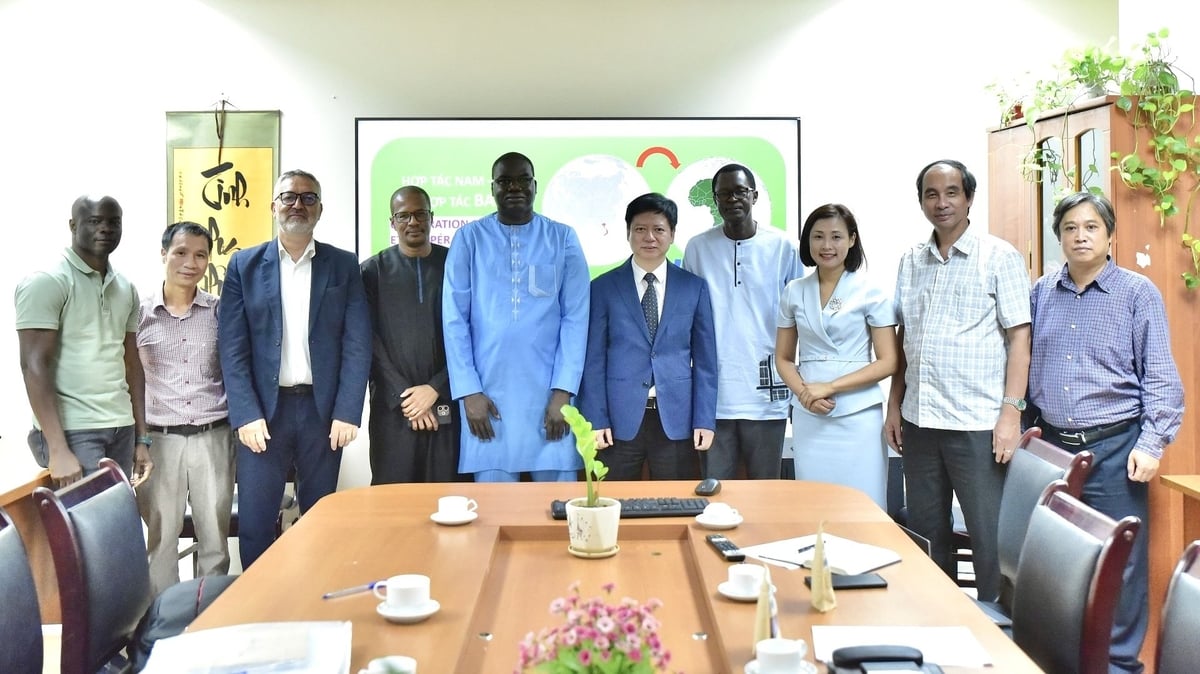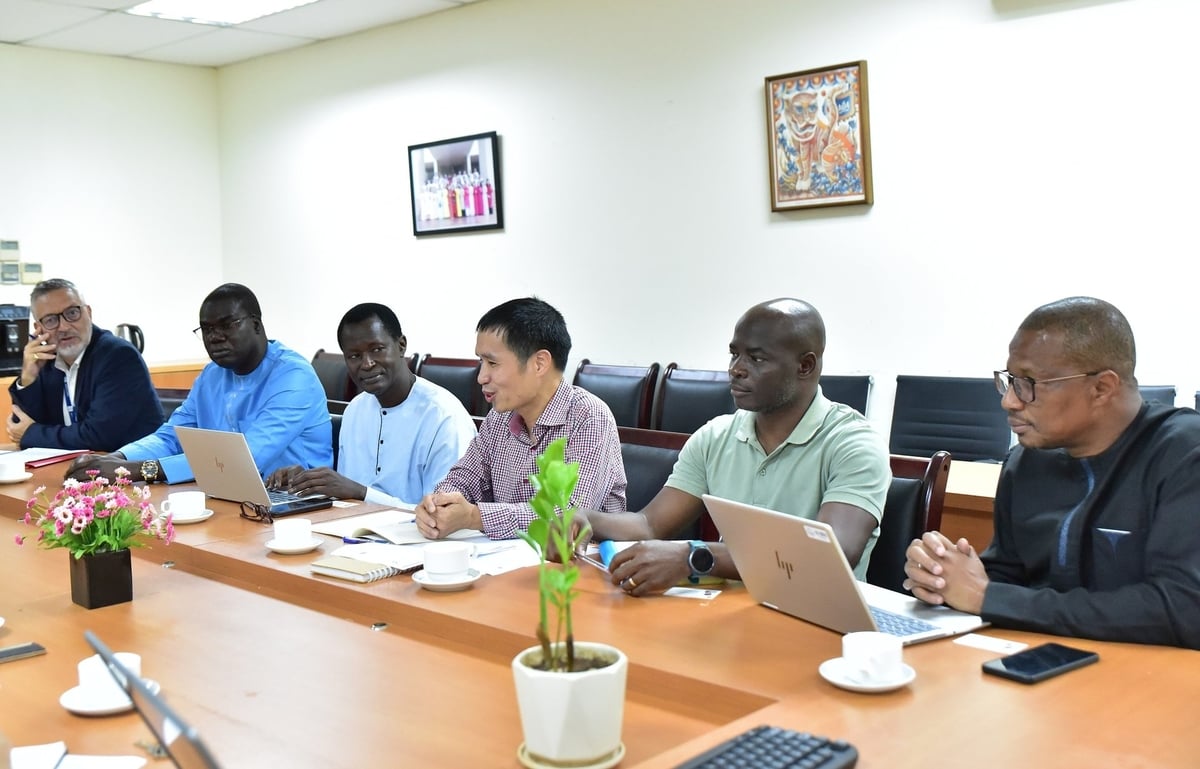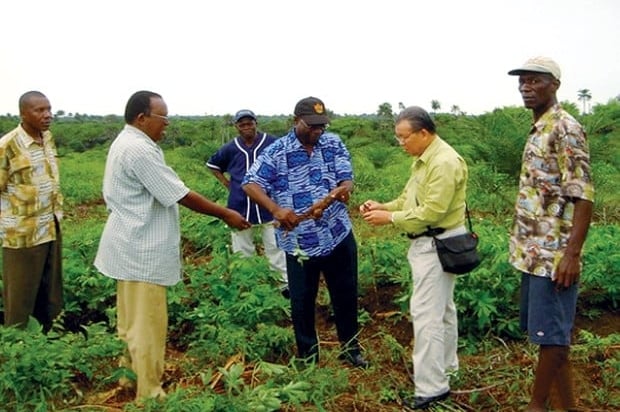November 19, 2025 | 08:54 GMT +7
November 19, 2025 | 08:54 GMT +7
Hotline: 0913.378.918
November 19, 2025 | 08:54 GMT +7
Hotline: 0913.378.918
On the afternoon of August 18, the International Cooperation Department (Ministry of Agriculture and Environment) held a working session with the Senegalese delegation led by Mr. Madiama Cissé, Director of Science at the Senegalese Institute of Agricultural Research (ISRA). Also in attendance was Dr. François Roger, Regional Director for Southeast Asia at the French Agricultural Research Centre for International Development (CIRAD).

Senegalese agricultural scientists are visiting Vietnam from August 18 to 24 to learn about agroecological models. Photo: Kieu Chi.
At the working session, the Senegalese side emphasized that rice is a central priority in the country’s agricultural development strategy. Currently, Senegal cultivates around 200,000 hectares of rice, yet it still relies heavily on imports to meet domestic demand. Mr. Waly Diouf, Coordinator of the National Program for Rice Self-Sufficiency (PNAR), noted: "Vietnam once went through the journey from being a food-deficient country to one of the world’s leading rice exporters. We are opent to learn from that invaluable experience, not only to achieve national rice self-sufficiency but also to move toward exports."
According to him, Senegal is facing mounting challenges from climate change, saltwater intrusion, and low productivity. Therefore, cooperation with Vietnam, which has achieved notable success in responding to climate change and restructuring its rice sector, is considered as an opportunity to identify best practices and solutions for building a climate-resilient food production system.

Vietnam and Senegal will jointly develop agricultural cooperation projects, with the support of CIRAD. Photo: Kieu Chi.
Following the meeting between the two Ministries during the high-level visit of National Assembly Chairman Tran Thanh Man at the end of July 2025, Senegal quickly dispatched a delegation to study agroecological and low-emission agricultural models. This move reflects Senegal’s strong determination to transform its food system and its confidence in making rapid and effective progress with Vietnam.
François Roger, Regional Director of CIRAD, affirmed: "We have supported and will continue to support the Vietnam and Senegal cooperation process. We hope that through upcoming missions and exchanges, both sides will be able to design more ambitious and effective technical cooperation projects."
Speaking at the meeting, Mr. Pham Ngoc Mau, Deputy Director General of the International Cooperation Department, recalled the transformation journey of Vietnam’s agriculture. Since the bold policy reforms of the 1980s, Vietnam has not only secured food self-sufficiency but also established its position with many high-value agricultural products.
Vietnam’s South-South cooperation projects with African countries are regarded as global models. To date, Vietnam has signed more than 30 agricultural cooperation agreements with African nations and implemented numerous tripartite projects with the support of FAO, JICA, the French Government, South Africa, and other international organizations. More than 400 Vietnamese agricultural experts and engineers have directly worked in Africa, providing technical assistance in rice, maize, cassava, and vegetable cultivation, as well as in mechanization transfer, helping to boost yields by two to four times in many regions.
Mr. Mau stressed: "We are willing to expand cooperation, particularly in green agriculture, sustainable rice sector restructuring, emissions reduction, and enhancing value addition."

Vietnam develops simple, easy-to-apply techniques that can be implemented under real conditions in Africa. Photo: SGTT.
Hearing about the Project on Sustainable Development of One Million Hectares of High-Quality and Low-Emission Rice, Senegal expressed its admiration for Vietnam’s ambitious goals and its capacity to meet the growing food demand of more than 100 million people. Mr. Waly Diouf emphasized that sustainable productivity-enhancing solutions could be particularly valuable if tested in Senegal.
Mr. Mau shared that Vietnam’s successful projects owe much to the contributions of national research institutes in improving crop varieties, innovating farming practices, irrigation systems, mechanization, as well as enhancing post-harvest preservation and processing.
Both sides agreed that for agricultural cooperation projects to succeed, strong consensus and participation from governments, the international community, and development organizations are essential. When developing projects in Africa, Vietnam will take into account both the country’s real needs and its own support capacity, in order to foster effective agricultural cooperation programs.
Concluding the meeting, Dr. Abou Sall, Director of Development and Local Government Support at SAED, viewed that Vietnam - Senegal agricultural cooperation is not merely about addressing food security, but also stands as a symbol of sharing, solidarity, and international unity.
Vietnam Agriculture and Nature Newspaper will update on technical exchange activities as well as field visits in Son La and Hung Yen provinces, carried out within the framework of SSTC in agriculture.
Translated by Kieu Chi

(VAN) Deputy Prime Minister Tran Hong Ha convened a meeting with the MAE and relevant agencies to discuss the draft decree on national multidimensional poverty standards for the 2026 - 2030 period.

(VAN) The year 2025 marks the 10th anniversary since more than 190 countries adopted the Paris Agreement on climate change, paving the way for strengthened global action.

(VAN) The PepsiCo Foundation funded the project ‘New Harvest: Sustainable Agriculture Initiative’, focusing on regenerative agriculture and climate change.

(VAN) Dr. Nguyen Viet Hung, ILRI's Regional Director for Asia, emphasized the One Health approach in ensuring food safety and reducing antimicrobial resistance risks in livestock.

(VAN) The youth-driven initiative ‘Innovate for water, act for the future’ seeks practical, scalable solutions to Vietnam’s water challenges.

(VAN) At the Annual Science Conference of Thuyloi University, Deputy Minister Phung Duc Tien directed researchers to focus on in-depth studies, data harmonization, and solutions linked to real-world practice.

(VAN) After nearly four years of implementation, 5,187 community agricultural extension groups have been established nationwide, with 47,493 members participating.